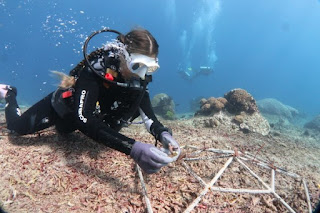The Conservation Business Model
In recent times, the world has witnessed a surge in environmental awareness, largely fueled by growing concerns over climate change, CO2 emissions, and the urgent need for conservation. This wave of eco-consciousness hasn't just swept through individuals and communities; it has also caught the attention of the business world. But as companies increasingly align themselves with conservation efforts, a critical question arises: Are these businesses genuinely committed to environmental stewardship, or are they merely capitalizing on a trend for profit, publicity, or other benefits?
 |
| Conservation surveys around the Gili Islands |
The Rise of Eco-Conscious Business Practices
The concept of businesses engaging in conservation isn't new. However, the current global environmental crisis has amplified this practice, turning it into a prominent trend. Companies across various sectors are now keen to showcase their "green" credentials, often through partnerships with non-governmental organizations (NGOs), investment in eco-friendly technologies, or adopting sustainable practices.
The Dichotomy of Intentions
On the surface, these initiatives appear noble and beneficial. But beneath this eco-friendly facade, the motivations can be complex. Some companies genuinely seek to make a positive environmental impact, driven by a deep-rooted belief in sustainability and corporate responsibility. For them, conservation is more than a buzzword; it's a core part of their business ethos.
Conversely, there are businesses that engage in what's known as "greenwashing" – a tactic to appear environmentally conscious for marketing or public relations benefits. These companies may make grand gestures, like donating significant sums to conservation NGOs, not primarily out of concern for the environment but as a strategy for tax advantages, brand enhancement, or to subtly influence the direction of environmental research and policies.
A Case in Point: Oceans 5 Gili Air
Oceans 5 Gili Air presents an intriguing case study in this context. Unlike many businesses that align with NGOs or seek external funding for conservation projects, Oceans 5 has chosen a different path. They prioritize autonomy in their environmental initiatives, focusing on making independent decisions regarding the nature and effectiveness of their research and collaborations.
This independence extends to their financial model as well. Oceans 5 invests its own funds into conservation efforts, steering clear of external donations or partnerships that could potentially sway their objectives or research outcomes. Their collaboration with the University of Mataram is a testament to this approach, highlighting a commitment to meaningful and self-directed conservation work.
The Future of Business and Conservation
As the global community becomes more environmentally conscious, the role of businesses in conservation will continue to evolve. The challenge lies in discerning genuine efforts from superficial ones. Companies like Oceans 5 Gili Air set an example by taking a stance that emphasizes independence and self-funding, ensuring that their conservation efforts remain true to their mission without external influences.
In conclusion, while the conservation business model presents a promising avenue for environmental stewardship, it is essential to scrutinize the underlying motivations and approaches of businesses in this arena. True commitment to conservation transcends financial investments and partnerships; it is rooted in an unwavering dedication to sustainable practices and a deep respect for the environment. As consumers and stakeholders, it's our responsibility to support and encourage businesses that demonstrate such genuine commitment to our planet's future.
Reacties
Een reactie posten